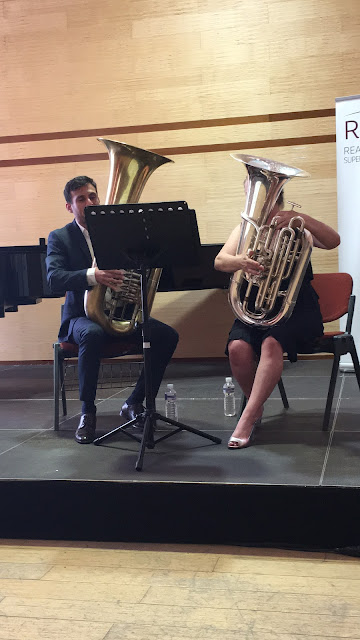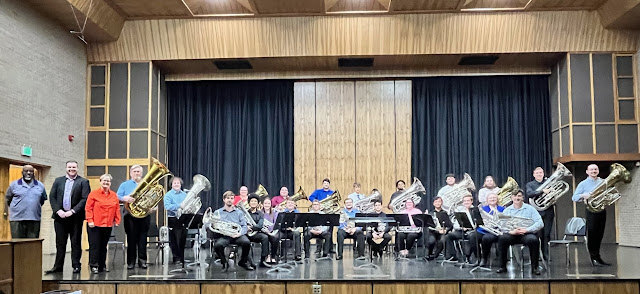Hello everyone. Today's interviewee is a reference in his country, Israel, a renowned and excellent tuba player and teacher to whom I am sincerely grateful for his friendship and collaboration in this interview project.
Let us begin.
• Name and surname:
• What instruments do you use?
F tuba: Meinl Weston 2182
C Tuba: Meinl Weston 6450 Baer
Mouthpiece: AR Resonance
• Tell us about your experiences and tastes of a particular manufacturer and why?
I chose these instruments due to budget, availability and brand reputation
Let's talk about your EDUCATION:
• When and where their studies or tuba euphonium started?
Started playing the tuba in Israel at age 12
I wanted to play a wind instrument and was offered the tuba at the local conservatory.
I Did my Bachelor Degree at the Peabody Conservatory and Masters Degree at the Juilliard School
• Who were your main teachers?
David Fedderly and Alan Baer
As for his PROFESSIONAL EXPERIENCE:
• Please leave us a little account of his experience as a soloist, a member of chamber ensembles, orchestra, band, etc.
I’m currently principal tubist of the Israel Police Band for almost 4 years. Playing in a professional wind ensemble is a great experience and very different from a symphony orchestra. A big part of the repertoire is marches and national anthems but we get to play other genres as well.
I’m also freelancing with local orchestras and ensembles and a member of the Israel Tuba Duo with Avital Handler, principal tubist of the Israel Opera.

TRYING OTHER TIPS OF INTEREST
Here in Spain, in some centers it is considered that the Euphonium, is an instrument that should have its own specialization and, on the other hand, some believe that, as an instrumentalist, one must know and master the tuba and euphonium.
• Could you give us your opinion on this and how would address this issue in the interests of education and training adapted to the necessary expertise required today?
 |
| With Avital Hadler in AETYB Madrid 2018 |
Let's talk about your TEACHING EXPERIENCE:
• Tell us what learning centers has taught (full-time professor, visiting professor, courses, lectures, etc.)
Before I joined the Police Band I used to teach all low brass instruments in a conservatory.
• How do you organize your classes and the subject in general?
Depends on the student need- usually warm up exercises, etudes and pieces.
• How long are your classes?
60 min
• Do you think it is important that students make public appearances during his years of training? If so, recommend how many times it deems appropriate and what age or course. Elementary, vocational, higher?
I think it is important for students to perform in order to have motivation to practice towards a goal whether for performance or audition.
An important part of the course curriculum is standardized and is based on the idea that students master the repertoire alone, sometimes to the detriment of the repertoire of large groups (Orchestra and Band), when in fact, most students Tuba and euphonium will be teachers and / or members of a band and, to a lesser extent, of an orchestra in the case of Tubas.
• In your opinion, how should this problem be addressed? How important do you think is include learning and mastery of the orchestral repertoire as part of the curriculum of the course?
Since the tuba is mostly an orchestral instrument, I believe that learning orchestral repertoire starting at an early stage is essential.
• Do you suggest any particular repertoire?
All orchestral repertoire is equally important for me.
• Is there a mandatory piece? If so, what is it?
I would say the Vaughan Williams tuba Concerto only because it is a required solo piece in almost every audition.
• What kind of repertoire you work primarily with your students? Solo, with piano accompaniment, chamber music, ...?
I work with my students on etudes, solos with or without piano accompaniment and orchestral repertoire. I believe that it is important to make a repertoire as diverse as possible.
SPEAKING OF TECHNICAL ISSUES:
• From your experience, could you give us your opinion on the different concepts of sound and what characteristics in your opinion define it, articulation, types of instruments, literature?
• Do you consider the influence of the language and musical tradition of a country on the sound and playing of a performer to be important?
I believe developing a high quality sound is by mouthpiece buzzing and having a concept of sound that you want to have in your mind.
A varied repertoire is essential for developing both sound and musical taste.
Haim, you are a recognized tuba player in your country and other lands.
• Please tell us about the tuba in Israel, history, study methodology, references, in short, everything you think is interesting to share with us.
Israel is a small country however produced extraordinary tuba players, starting with the legendary former tubist of the Israel Philharmonic Orchestra, Adi Hershko who taught many tuba players throughout the years.
 |
| Left to Right Haim, Avital and the interviewer |
Please tell us about your experiences and what differences there are, if any, between the preparation of American and European tuba players
Mostly Israel tuba players are more American oriented since many went to study in the United States.
IN CONCLUSION:
The research carried out and contrasted agree that there are five historically recognised methodologies for teaching the tuba and euphonium in the world. The American, the English, the French, the German and the Russian.
In your experience, do you think the diversity of performers, instruments and the opportunity to train in various specialized schools is homogenizing in interpretive centers already established? (Example: Russian, American, German-Austrian, English, etc.).
I think that diversity is great and gives us the opportunity to learn from everyone.
Haim , it´s a big pleasure and an honor to count on your experience, collaboration in this series of interviews and longtime friendship.
Thank you very much and my best wishes.
A big hug.























